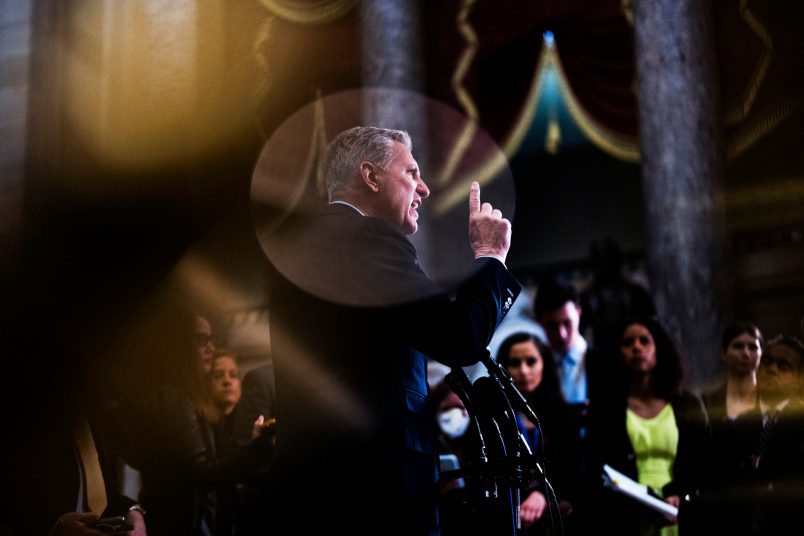The looming standoff over the debt limit has been telegraphed for months. And now, just days into the new Congress, it has arrived.
Republicans have made their intentions clear since at least October: Take the debt limit hostage as a bargaining chip, demanding cuts to programs the party has long sought to slash, such as Medicare and Social Security.
The White House has repeatedly said it won’t play ball, and did so again after Treasury Secretary Janet Yellen warned the U.S. would hit the debt limit Thursday, and that her department would begin “extraordinary measures” to continue to fulfill the U.S.’s obligations. “There is going to be no negotiation over it,” White House Press Secretary Karinne Jean-Pierre said. “This is something that must get done.”
Yet Republicans, having captured their hostage, were not keen to take no for an answer.
“When President Biden says he’s just going to refuse to negotiate with Republicans on any concessions, I don’t think that’s right either,” said Rep. Don Bacon (R-NE) in an interview with ABC This Week on Sunday.
“I want our side to negotiate with the Democrats in good faith,” he said later in the interview. “But President Biden has to also negotiate. He can’t say he refuses to negotiate.”
Republicans have periodically taken the debt ceiling hostage as a bargaining chip, threatening the full faith and credit of the U.S. and raising the possibility that a government on which the world’s economy relies might default on its debt. To justify such a maneuver, Republicans habitually conflate the budgeting process — in which Congress decides what it will spend money on — with the debt ceiling, which allows the administration to borrow money to cover expenses largely made up of funds Congress has already appropriated.
Bacon, a McCarthy ally in his recent speakership fight, leaned into that conflation, telling ABC that “the mission we’ve given is to control reckless spending, which has been not the only contributor but one of the main contributors to inflation.”
The hope, for Republicans, is that Americans will share their party’s seeming confusion about just what is going on here. Rep. James Comer (R-KY) went there too, claiming in a separate interview with CNN’s Jake Tapper Sunday that “Republicans were elected with a mandate from the American people in the midterm elections. We campaigned on the fact that we were going to be serious about spending cuts. So, the Senate is going to have to recognize the fact that we’re not going to budge until we see meaningful reform with respect to spending.”
On Friday, the Washington Post reported that Republicans plan to revive an idea from Obama-era bouts of debt-limit hostage taking: “prioritization.” It was part of the anti-Kevin Freedom Caucus contingent’s deal with now-Speaker of the House Kevin McCarthy that ultimately got him the support he needed, the Post reported.
“We agreed to advance a debt prioritization bill through regular order by the end of the first quarter of 2023,” Rep. Chip Roy (R-TX), an outspoken far-right Republican, told the Washington Post in a text message. “Now, the contours of that were not specified (there are different versions).”
Under the plan, the House would pass a bill demanding that the administration continue to make certain payments while shutting down other federal programs, theoretically allowing the U.S. to avoid default.
But such a bill would not pass the Senate, nor would it be signed by Biden. It also wouldn’t be feasible. It would, however, allow House Republicans to claim they had done their part to avoid default.
“Studying this in 2011 convinced us this would be a really bad idea and something we really did not want to happen,” Brian Riedl, a policy analyst for the conservative Manhattan Institute and a former staffer to Sen. Rob Portman (R-OH), told the Post. “We didn’t end the exercise saying, ‘This is feasible and smart.’ We said, ‘Let’s avoid this at all costs because it’s going to be a disaster.’”
Just the prospect of a U.S. debt default due to Republican brinksmanship resulted in credit-rating agencies downgrading their rating for the U.S. federal government in 2011.
Since the coming debt-ceiling standoff was first unveiled last year, Democrats have been unequivocal that they won’t engage in such a dangerous game.
“We shouldn’t be playing chicken with the American economy,” Sen. Raphael Warnock (D-GA) told This Week on Sunday. “This is not a game. This is people’s lives.”
Sen. Brian Schatz (D-HI) was more colorful, borrowing a counteroffer from The Godfather.
“In exchange for not crashing the United States economy, you get nothing,” Schatz told The Daily Beast.
“You don’t get a cookie. You don’t get to be treated like you’re the second coming of LBJ,” he added. “You’re just a person doing the bare minimum of not intentionally screwing over your constituents for insane reasons.”







The GOP’s War on America must succeed. Heil!
Bacon started the GOP campaign to get the media to ask, ‘but why won’t the Democrats and WH negotiate? Can’t they agree to cut spending and reduce the deficit to live within our means?’. The Dems can’t waver here. I’m not worried about Biden or Senate Dems. It’s not their first rodeo. House Dems can sometimes have loose cannons. Jeffries has to keep his folks in line. No negotiating with terrorists.
So how does this.play out? Repugs flat out refuse to bring a vote to the floor?
Far better to get the shaft and a crushing defeat in '24 but, yeah, ‘nothing’ is a reasonable second best I suppose as long as it’s understood there is no third best.
“Mandate” my ass